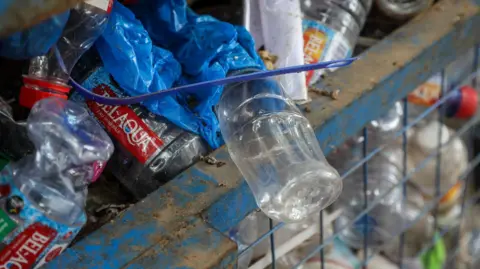In recent discussions about global environmental challenges, the issue of plastic pollution has emerged front and center, as countries converge to address what is being referred to as the ‘plastic crisis.’ The alarming escalation in plastic production over the past century has provoked polarized opinions, with some heralding it as a miraculous innovation while others decry its profound detrimental impact on ecosystems. With scientists estimating that nearly 200 trillion pieces of plastic are currently adrift in oceans, this figure is projected to triple if concrete actions are not taken promptly. The urgency of this matter has led to international dialogues aimed at creating a legally binding global treaty to tackle plastic waste and the hazardous chemicals found in many plastics. However, despite substantial negotiations over the last two years, progress has stalled, leaving many potentially effective solutions unaddressed.
This week, representatives from nations around the world gathered at a United Nations conference in Geneva in hopes of breaking the deadlock and moving forward with a cohesive strategy. A core part of this effort revolves around understanding valuable aspects of plastics. Human civilization has utilized naturally occurring plastics for centuries, such as rubber and shellac. However, the 20th century saw a significant transition to synthetic plastics, crafted from fossil fuels, which provide numerous benefits due to their versatility and durability. Their application ranges from essential medical equipment to construction materials. Despite their advantages, there is increasing concern regarding their long-term effects on health and environmental sustainability, calling into question the wisdom of their wide-reaching use.
The growth of plastic production has steadily increased from 2 million tons in 1950 to a staggering 475 million tons by 2022. The reality is that while plastic materials can potentially be recycled, only around 10% currently undergoes this process. Alarmingly, more than 60% of plastic produced is single-use, leading to significant waste accumulation. Research highlights that marine wildlife is particularly vulnerable, as many species mistake plastic for food, leading to dire consequences ranging from organ damage to death. As highlighted by Zaynab Sadan, a global plastics policy lead at the World Wildlife Fund (WWF), discarded plastic poses threats not only through ingestion but also through entanglement in fishing gear and illegally dumped waste.
The breakdown of plastic into microplastics poses an additional challenge, with these minuscule particles being found in various environments, from the deepest parts of our oceans to remote mountain regions. Their omnipresence raises significant environmental concerns and inflicts harm on living organisms. Dr. Alice Horton from the National Oceanography Centre emphasizes that as these plastics accumulate in biological tissues, they can lead to inflammation, hormonal disruptions, and long-term damage to wildlife populations.
Beyond environmental health, human populations also face risks from plastic pollution. A recent report from The Lancet Countdown termed plastic pollution as a “grave, growing and under-recognized danger,” attributing approximately $1.5 trillion annually in health-related damages to its impact. This includes respiratory issues, various cancers, and adverse reproductive health outcomes linked to exposure to toxic substances often present in plastic products.
In light of these pressing challenges, the focus shifts to what specific agreements countries are striving to finalize at the Geneva conference. Since 2022, there has been widespread acknowledgment of the necessity for a global treaty, and the finale of negotiations ended with no formal agreement due by December 2024. As representatives from over 170 nations reconvene, critical discussion points include establishing targets for reducing single-use plastic production, banning hazardous chemicals in plastics, and devising universal guidelines for product design to facilitate recycling efforts.
Although nearly 100 nations advocate for ambitious measures, there is formidable opposition from oil-exporting countries. These nations fear that enhanced regulations will jeopardize their economic interests, especially as demand for oil shifts towards greener alternatives. Yet, as Rob Opsomer from the Ellen MacArthur Foundation points out, lack of consistent regulations imposes economic risks on businesses globally.
In considering personal contributions to alleviating plastic waste, consumers play a pivotal role. Avoiding single-use plastics, opting for reusable containers, and reducing reliance on car travel by walking or biking can collectively signify a meaningful step towards mitigating this issue. With the understanding that the responsibility to combat plastic pollution extends beyond just political frameworks, the cooperative efforts of individuals, businesses, and nations hold significant potential in averting a deeper environmental crisis.












